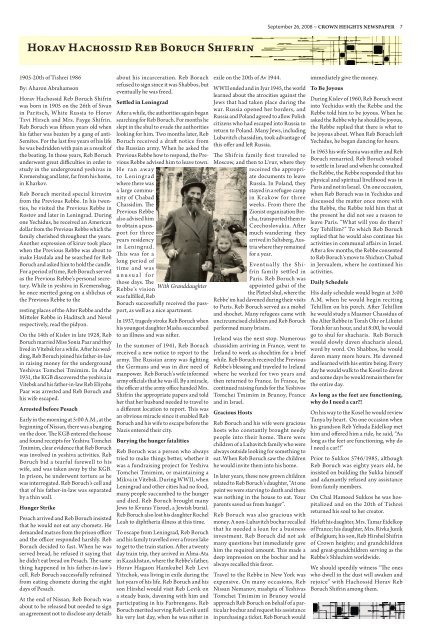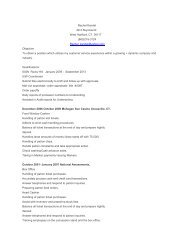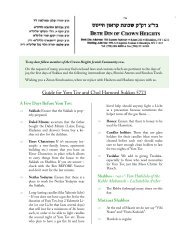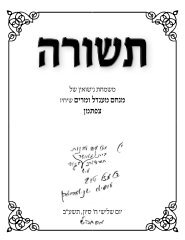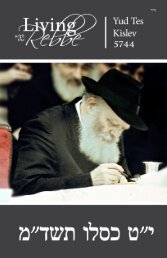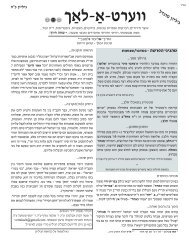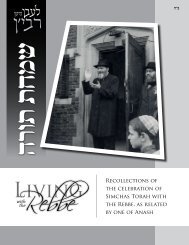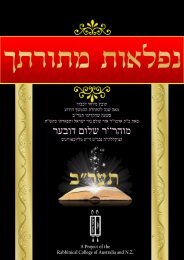THE REBBE'S OWN UNITED NATIONS - COLlive.com
THE REBBE'S OWN UNITED NATIONS - COLlive.com
THE REBBE'S OWN UNITED NATIONS - COLlive.com
Create successful ePaper yourself
Turn your PDF publications into a flip-book with our unique Google optimized e-Paper software.
September 26, 2008 ~ cr<strong>OWN</strong> heights Newspaper 7<br />
Horav Hachossid Reb Boruch Shifrin<br />
1905-20th of Tishrei 1986<br />
By: Aharon Abrahamson<br />
Horav Hachossid Reb Boruch Shifrin<br />
was born in 1905 on the 26th of Sivan<br />
in Paritsch, White Russia to Horav<br />
Tzvi Hirsch and Mrs. Fayge Shifrin.<br />
Reb Boruch was fifteen years old when<br />
his father was beaten by a gang of anti-<br />
Semites. For the last five years of his life<br />
he was bedridden with pain as a result of<br />
the beating. In those years, Reb Boruch<br />
underwent great difficulties in order to<br />
study in the underground yeshivas in<br />
Kremenshug and later, far from his home,<br />
in Kharkov.<br />
Reb Boruch merited special kiruvim<br />
from the Previous Rebbe. In his twenties,<br />
he visited the Previous Rebbe in<br />
Rostov and later in Leningrad. During<br />
one Yechidus, he received an American<br />
dollar from the Previous Rebbe which the<br />
family cherished throughout the years.<br />
Another expression of kiruv took place<br />
when the Previous Rebbe was about to<br />
make Havdala and he searched for Reb<br />
Boruch and asked him to hold the candle.<br />
For a period of time, Reb Boruch served<br />
as the Previous Rebbe’s personal secretary.<br />
While in yeshiva in Kremenshug,<br />
he once merited going on a shlichus of<br />
the Previous Rebbe to the<br />
resting places of the Alter Rebbe and the<br />
Mitteler Rebbe in Haditsch and Nevel<br />
respectively, read the pidyon.<br />
On the 14th of Kislev in late 1928, Reb<br />
Boruch married Miss Sonia Paar and they<br />
lived in Vitebsk for a while. After his wedding,<br />
Reb Boruch joined his father-in-law<br />
in raising money for the underground<br />
Yeshivas Tomchei Tmimim. In Adar<br />
1931, the KGB discovered the yeshiva in<br />
Vitebsk and his father-in-law Reb Eliyohu<br />
Paar was arrested and Reb Boruch and<br />
his wife escaped.<br />
Arrested before Pesach<br />
Early in the morning at 5:00 A.M., at the<br />
beginning of Nissan, there was a banging<br />
on the door. The KGB entered the house<br />
and found receipts for Yeshiva Tomchei<br />
Tmimim, clear evidence that Reb Boruch<br />
was involved in yeshiva activities. Reb<br />
Boruch bid a tearful farewell to his<br />
wife, and was taken away by the KGB.<br />
In prison, he underwent torture as he<br />
was interrogated. Reb Boruch’s cell and<br />
that of his father-in-law was separated<br />
by a thin wall.<br />
Hunger Strike<br />
Pesach arrived and Reb Boruch insisted<br />
that he would not eat any chometz. He<br />
demanded matzos from the prison officer<br />
and the officer responded harshly. Reb<br />
Boruch decided to fast. When he was<br />
served bread, he refused it saying that<br />
he didn’t eat bread on Pesach. The same<br />
thing happened in his father-in-law’s<br />
cell. Reb Boruch successfully refrained<br />
from eating chometz during the eight<br />
days of Pesach.<br />
At the end of Nissan, Reb Boruch was<br />
about to be released but needed to sign<br />
an agreement not to disclose any details<br />
about his incarceration. Reb Boruch<br />
refused to sign since it was Shabbos, but<br />
eventually he was freed.<br />
Settled in Leningrad<br />
After a while, the authorities again began<br />
searching for Reb Boruch. For months he<br />
slept in the shul to evade the authorities<br />
looking for him. Two months later, Reb<br />
Boruch received a draft notice from<br />
the Russian army. When he asked the<br />
Previous Rebbe how to respond, the Previous<br />
Rebbe advised him to leave town.<br />
He ran away<br />
to Leningrad<br />
where there was<br />
a large <strong>com</strong>munity<br />
of Chabad<br />
Chassidim. The<br />
Previous Rebbe<br />
also advised him<br />
to obtain a passport<br />
for three<br />
years residency<br />
in Leningrad.<br />
This was for a<br />
long period of<br />
time and was<br />
u n u s u a l f o r<br />
those days. The<br />
Rebbe’s vision<br />
was fulfilled, Reb<br />
With Granddaughter<br />
Boruch successfully received the passport,<br />
as well as a nice apartment.<br />
In 1937, tragedy stroke Reb Boruch when<br />
his youngest daughter Masha succumbed<br />
to an illness and was nifter.<br />
In the summer of 1941, Reb Boruch<br />
received a new notice to report to the<br />
army. The Russian army was fighting<br />
the Germans and was in dire need of<br />
manpower. Reb Boruch’s wife informed<br />
army officials that he was ill. By a miracle,<br />
the officer at the army office handed Mrs.<br />
Shifrin the appropriate papers and told<br />
her that her husband needed to travel to<br />
a different location to report. This was<br />
an obvious miracle since it enabled Reb<br />
Boruch and his wife to escape before the<br />
Nazis entered their city.<br />
Burying the hunger fatalities<br />
Reb Boruch was a person who always<br />
tried to make things better, whether it<br />
was a fundraising project for Yeshiva<br />
Tomchei Tmimim, or maintaining a<br />
Mikva in Vitebsk. During WWII, when<br />
Leningrad and other cities had no food,<br />
many people succumbed to the hunger<br />
and died. Reb Boruch brought many<br />
Jews to Kvuras Yisroel, a Jewish burial.<br />
Reb Boruch also lost his daughter Rochel<br />
Leah to diphtheria illness at this time.<br />
To escape from Leningrad, Reb Boruch<br />
and his family travelled over a frozen lake<br />
to get to the train station. After a twenty<br />
day train trip, they arrived in Alma-Ata<br />
in Kazakhstan, where the Rebbe’s father,<br />
Horav Hagaon Hamkubel Reb Levi<br />
Yitzchok, was living in exile during the<br />
last years of his life. Reb Boruch and his<br />
son Hirshel would visit Reb Levik on<br />
a steady basis, davening with him and<br />
participating in his Farbrengens. Reb<br />
Boruch merited serving Reb Levik until<br />
his very last day, when he was nifter in<br />
exile on the 20th of Av 1944.<br />
WWII ended and in Iyar 1945, the world<br />
learned about the atrocities against the<br />
Jews that had taken place during the<br />
war. Russia opened her borders, and<br />
Russia and Poland agreed to allow Polish<br />
citizens who had escaped into Russia to<br />
return to Poland. Many Jews, including<br />
Lubavitch chassidim, took advantage of<br />
this offer and left Russia.<br />
The Shifrin family first traveled to<br />
Moscow, and then to L’vuv, where they<br />
received the appropriate<br />
documents to leave<br />
Russia. In Poland, they<br />
stayed in a refugee camp<br />
in Krakow for three<br />
weeks. From there the<br />
Zionist organization Brecha,<br />
transported them to<br />
Czechoslovakia. After<br />
much wandering they<br />
arrived in Saltsberg, Austria<br />
where they remained<br />
for a year.<br />
Eventually the Shifrin<br />
family settled in<br />
Paris. Reb Boruch was<br />
appointed gabai of the<br />
the Pletzel shul, where the<br />
Rebbe’im had davened during their visits<br />
to Paris. Reb Boruch served as a mohel<br />
and shochet. Many refugees came with<br />
uncircumcised children and Reb Boruch<br />
performed many brisim.<br />
Ireland was the next stop. Numerous<br />
chassidim arriving in France, went to<br />
Ireland to work as shochtim for a brief<br />
while. Reb Boruch received the Previous<br />
Rebbe’s blessing and traveled to Ireland<br />
where he worked for two years and<br />
then returned to France. In France, he<br />
continued raising funds for the Yeshivos<br />
Tomchei Tmimim in Brunoy, France<br />
and in Israel.<br />
Gracious Hosts<br />
Reb Boruch and his wife were gracious<br />
hosts who constantly brought needy<br />
people into their home. There were<br />
children of a Lubavitch family who were<br />
always outside looking for something to<br />
eat. When Reb Boruch saw the children<br />
he would invite them into his home.<br />
In later years, these now grown children<br />
related to Reb Boruch’s daughter, “At one<br />
point we were starving to death and there<br />
was nothing in the house to eat. Your<br />
parents saved us from hunger”.<br />
Reb Boruch was also gracious with<br />
money. A non-Lubavitch bochur recalled<br />
that he needed a loan for a business<br />
investment. Reb Boruch did not ask<br />
many questions but immediately gave<br />
him the required amount. This made a<br />
deep impression on the bochur and he<br />
always recalled this favor.<br />
Travel to the Rebbe in New York was<br />
expensive. On many occasions, Reb<br />
Nissan Nemanov, mashpia of Yeshivas<br />
Tomchei Tmimim in Brunoy would<br />
approach Reb Boruch on behalf of a particular<br />
bochur and request his assistance<br />
in purchasing a ticket. Reb Boruch would<br />
immediately give the money.<br />
To Be Joyous<br />
During Kislev of 1960, Reb Boruch went<br />
into Yechidus with the Rebbe and the<br />
Rebbe told him to be joyous. When he<br />
asked the Rebbe why he should be joyous,<br />
the Rebbe replied that there is what to<br />
be joyous about. When Reb Boruch left<br />
Yechidus, he began dancing for hours.<br />
In 1963 his wife Sunia was nifter and Reb<br />
Boruch remarried. Reb Boruch wished<br />
to settle in Israel and when he consulted<br />
the Rebbe, the Rebbe responded that his<br />
physical and spiritual livelihood was in<br />
Paris and not in Israel. On one occasion,<br />
when Reb Boruch was in Yechidus and<br />
discussed the matter once more with<br />
the Rebbe, the Rebbe told him that at<br />
the present he did not see a reason to<br />
leave Paris. “What will you do there?<br />
Say Tehillim?” To which Reb Boruch<br />
replied that he would also continue his<br />
activities in <strong>com</strong>munal affairs in Israel.<br />
After a few months, the Rebbe consented<br />
to Reb Boruch’s move to Shichun Chabad<br />
in Jersualem, where he continued his<br />
activities.<br />
Daily Schedule<br />
His daily schedule would begin at 3:00<br />
A.M. when he would begin reciting<br />
Tehillim on his porch. After Tehillim<br />
he would study a Maamor Chassidus of<br />
the Alter Rebbe in Torah Ohr or Likutei<br />
Torah for an hour, and at 8:00, he would<br />
go to shul for shacharis. Reb Boruch<br />
would slowly daven shacharis aloud,<br />
word by word. On Shabbos, he would<br />
daven many more hours. He davened<br />
and learned with his entire being. Every<br />
day he would walk to the Kosel to daven<br />
and some days he would remain there for<br />
the entire day.<br />
As long as the feet are functioning,<br />
why do I need a car?!<br />
On his way to the Kosel he would review<br />
Tanya by heart. On one occasion when<br />
his grandson Reb Yehuda Eidelkop met<br />
him and offered him a ride, he said, “As<br />
long as the feet are functioning, why do<br />
I need a car?!”<br />
Prior to Sukkos 5746/1985, although<br />
Reb Boruch was eighty years old, he<br />
insisted on building the Sukka himself<br />
and adamantly refused any assistance<br />
from family members.<br />
On Chal Hamoed Sukkos he was hospitalized<br />
and on the 20th of Tishrei<br />
returned his soul to her creator.<br />
He left his daughter, Mrs. Tamar Eidelkop<br />
of France; his daughter, Mrs. Rivka Junik<br />
of Belgium; his son, Reb Hirshel Shifrin<br />
of Crown heights; and grandchildren<br />
and great-grandchildren serving as the<br />
Rebbe’s Shluchim worldwide.<br />
We should speedily witness “The ones<br />
who dwell in the dust will awaken and<br />
rejoice” with Hachossid Horav Reb<br />
Boruch Shifrin among them.


